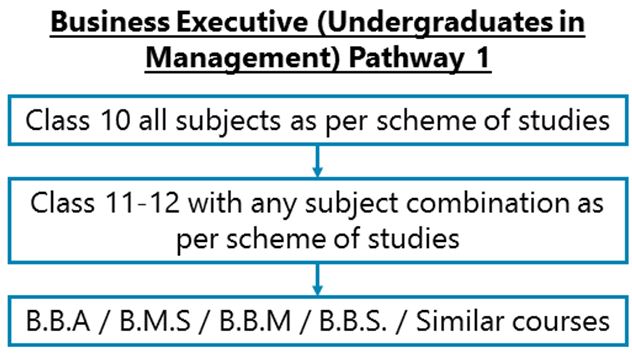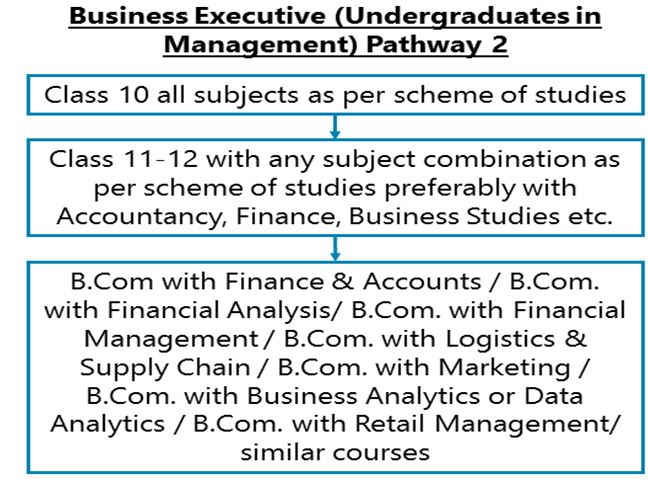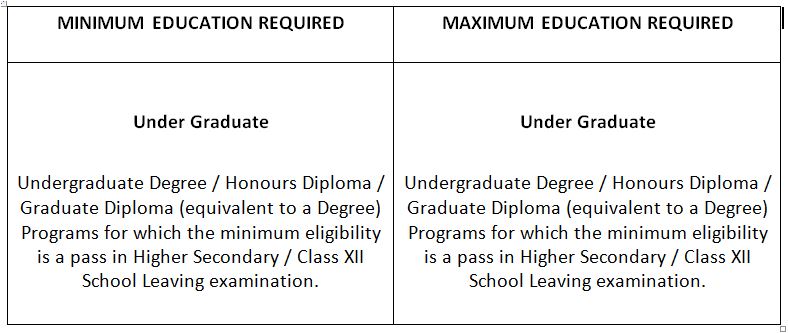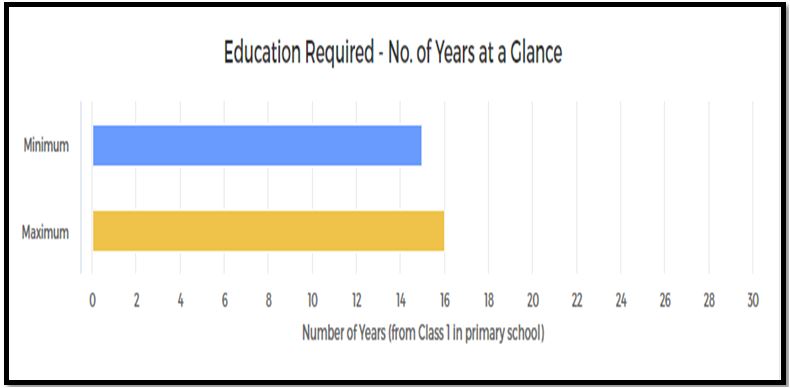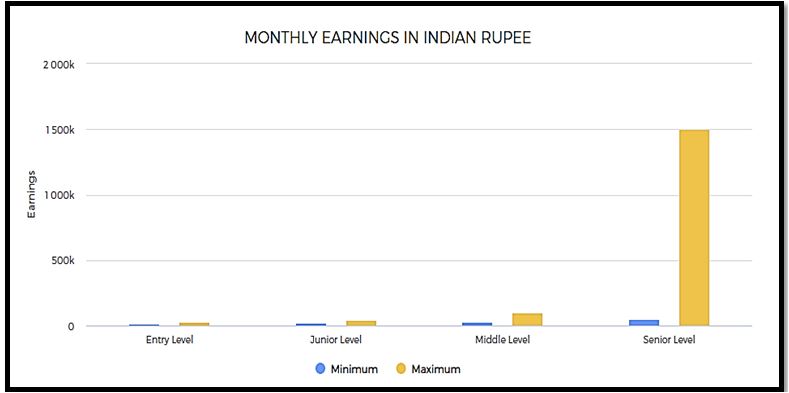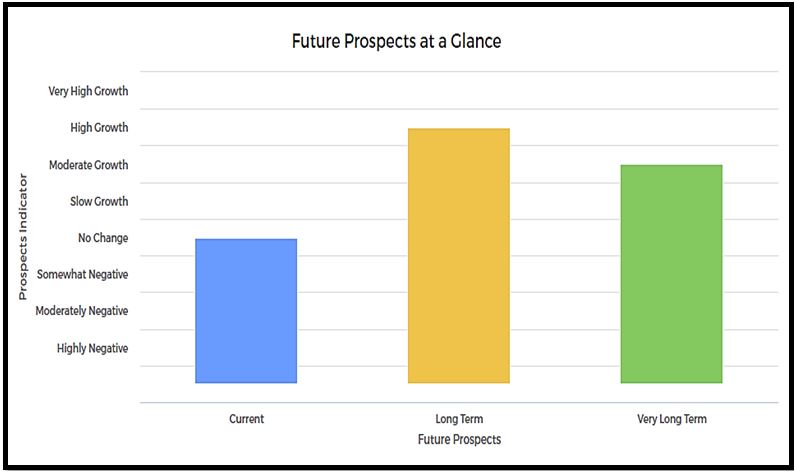Business Executive
Entry Level Qualification
10
Career Fields
Business & Management
For Specially Abled







Career Entrance Exam
About Career
Business Executives work at the forefront of business operations. They are often the face of the organisations they work for and represent the organisations to different people such as the customers of the organisations, suppliers (of raw materials and services) of the organisations, executives of other organisations and government officials. They even represent their organisations to potential employees as well as the employees who are working with the organisations.
PARTICULARS | DESCRIPTION |
Name | Business Executive |
Purpose | Overseeing Business Operations |
Career Field | Business & Management |
Required Entrance Exam | CAT |
Average Salary | 150000 - 300000 Rs. Per Year |
Companies For You | Financial Advisors, Tele-broker, Dealer & Many More |
Who is Eligible | Class 12th Pass |
Career Entry Pathway
Class 10 all subjects as per scheme of studies - Class 11-12 with any subject combination as per scheme of studies – B.B.A / B.M.S / B.B.M / B.B.S. / Similar courses
After your Class 11-12 with any subject combination as per scheme of studies. However, you may do well if you have Mathematics till class 10. It is not mandatory though. After your class 11-12, you can either take direct admission on the basis of your marks obtained in the class 12th final examination or on the basis of your performance in a written entrance examination conducted by an institute or University for admission to bachelor degree programs in Business Administration or Business Management. Some colleges and institutes admit you on the basis of your performance in the UGAT (Undergraduate Aptitude Test) examination conducted by AIMA (All India Management Association). After your 11-12, you can study a Bachelor degree program in Business Administration (B.B.A.), Management Studies (B.M.S.), Business Management (B.B.M.), Business Studies (B.B.S.) or study for a specialised B.B.A. such as B.B.A. in BFSI (Banking, Financial Services, & Insurance), B.B.A. in Financial & Investment Analysis, B.B.A. in Business Analysis/Data Analysis, B.B.A. with Digital Marketing, B.B.A. in Retail Management, B.B.A. in Aviation Management, B.B.A. in Healthcare Management, etc.
Class 10 all subjects as per scheme of studies - Class 11-12 with any subject combination as per scheme of studies – B.Com with Finance & Accounts / B.Com. With Financial Analysis/ B.Com. With Financial Management / B.Com. with Logistics & Supply Chain / B.Com. with Marketing / B.Com. with Business Analytics or Data Analytics / B.Com. with Retail Management/ similar courses
After your Class 11-12 with any subject combination as per scheme of studies. However, you may do well if you have Mathematics till class 10. It is not mandatory though. After your class 11-12, you can do a B.Com. or similar program with a specialisation in Finance, Financial Analysis, Financial Management / Logistics & Supply Chain / Marketing / Business Analytics or Data Analytics / Retail Management / similar other B.Com. programs.
Required Qualification & Competencies
To become a Business Executive, you can study for a Bachelor’s degree in any of the fields mentioned below or you can do a B.B.A./ B.M.S. / B.B.M. / B.B.S. or a similar degree with specialisation in any of the following fields:
1. Administration Management
2. Aviation Management
3. Banking and Financial Services
4. Banking, Financial Services and Insurance (BFSI)
5. Business Administration
6. Business Analytics and Business Intelligence
7. Business Economics
8. Business Information Systems
9. Digital Marketing
10. Entrepreneurship
11. Event Management
12. Financial Accounting
13. Financial Analysis
14. Financial Management
15. Healthcare Management
16. Hospital Administration & Management
17. Human Resources Management
18. Information Technology Management
19. Insurance
20. Logistics and Supply Chain Management
21. Marketing Management
22. Operations Management
23. Retail Management
24. Rural Administration and Management
25. Sales Management
26. Sports Administration and Management
27. Supply Chain Management
28. Travel and Tourism Management (Business)
COMPETENCIES REQUIRED
1. Interests
Enterprising: You should have interests for Enterprising Occupations. Enterprising occupations involve taking initiatives, initiating actions, and planning to achieve goals, often business goals. These involve gathering resources and leading people to get things done. These require decision making, risk taking and action orientation.
Conventional: You should have interests for Conventional Occupations. Conventional occupations involve repetitive and routine tasks as well as fixed processes or procedures for getting things done. These occupations involve working more with data, systems, and procedures and less with ideas or creativity.
Social: You should have interests for Social Occupations. Social occupations involve helping or assisting others; these involve working with and communicating with people to provide various services; these may involve educating and advising others.
2. Abilities
Abstract Reasoning: The ability to understand ideas which are not expressed in words or numbers; the ability to understand concepts which are not clearly expressed verbally or otherwise.
Articulation: The ability to speak clearly so others can understand you.
Deductive Reasoning: The ability to apply general rules and common logic to specific problems to produce answers that are logical and make sense. For example, understanding the reasons behind an event or a situation using general rules and common logic.
Emotional Intelligence: The ability to understand your own and others' emotions and feelings; empathy for others; adjusting your behaviour or self-control and self-regulation according to others' emptions and situations.
Fluency of Ideas: The ability to come up with a number of ideas about a topic (the number of ideas is important, not their quality, correctness, or creativity).
Inductive Reasoning: The ability to combine pieces of information from various sources, concepts, and theories to form general rules or conclusions. For example, analysing various events or situations to come out with a set of rules or conclusions.
Inter-Personal: The ability to build and maintain good relationships with others at workplaces and elsewhere.
Intrapersonal: The ability to clearly understand your strengths and weaknesses, what your capabilities are, what you can do and cannot do, what you like and dislike.
Numerical Reasoning: The ability to add, subtract, multiply, divide, and perform other basic numerical calculations correctly.
Oral Comprehension: The ability to listen to and understand information and ideas presented through spoken words and sentences.
Oral Expression: The ability to communicate information and ideas in speaking so others will understand.
Originality: The ability to come up with unusual or innovative ideas about a given topic or situation, or to develop creative ways to solve a problem.
Problem Sensitivity: The ability to tell when something is wrong or is likely to go wrong. It does not involve solving the problem, only recognizing there is a problem.
Selective Attention: The ability to concentrate on a task over a long period of time without being distracted.
Speed of Closure: The ability to quickly make sense of, combine, and organize information into meaningful patterns.
Verbal Reasoning: The ability to think and reason with words; the ability to reason out ideas expressed in words.
Written Comprehension: The ability to read and understand information and ideas presented in writing.
Written Expression: The ability to communicate information and ideas in writing so others will understand.
3. Knowledge
Business Management: Knowledge of managing a business which involves planning of what to do, organising resources and people, leading and supervising work activities of people, and monitoring performances of people as well as performance of business. This includes knowledge of marketing, finance, human resources management, operations management, etc.
Customer Service: Knowledge about how to provide customer services. This includes understanding customer needs, helping customers to use products and services, answering customer queries, handling customer complaints and grievances, and evaluating customer satisfaction.
Human Resources: Knowledge about the theories and procedures for recruitment, selection, induction, placement, compensation, performance management, training and development and various other aspects of human resources in organisations.
Marketing: Knowledge of the various principles, theories, methods, systems and processes to understand the needs of a category of customers and then creating, communicating, and delivering various products and services in order to satisfy the needs of the customers.
Sales and Promotion: Knowledge of the various principles, theories, methods, systems and processes to communicate and promote the benefits of various products or services of an organisation to a targeted group of customers, influencing their buying decisions and convincing them to buy the products or services.
4. Skills
Active Learning: Focused and continuous learning from various sources of information, observation and otherwise for application in getting work done.
Active Listening: Giving full attention to what other people are saying, understanding the points being made by others, asking questions, etc.
Communication in English: Skills in communicating effectively in writing as well as verbally with others in English language.
Coordination: Skills in working together with other people to get things done.
Critical Thinking: Skills in analysis of complex situations, using of logic and reasoning to understand the situations and take appropriate actions or make interpretations and inferences.
Judgment and Decision Making: Skills in considering pros and cons of various decision alternatives; considering costs and benefits; taking appropriate and suitable decisions.
Negotiation: Skills in bringing others together and trying to reconcile differences.
Persuasion: Skills in persuading others to change their minds or behaviour.
Problem Solving: Skills in analysis and understanding of problems, evaluating various options to solve the problems and using the best option to solve the problems.
Reading Comprehension: Skills in understanding written sentences and paragraphs in work related documents.
Selling: Skills in promoting and canvassing about various products and services to prospective customers; influencing their decisions to buy the products and services; and making sure that they get the delivery of the products and services.
Time Management: Skills in prioritizing work, managing time effectively.
5. Personality
1. You are always or mostly organised in your day-to-day life and activities.
2. You always feel secure in your surroundings and in most situations.
3. You are always self-satisfied or feel satisfied with your life in most situations.
4. You are a soft-hearted person sometimes.
5. You trust others sometimes but not always.
6. You are helpful to others sometimes.
7. You remain calm in difficult situations sometimes but some other times you are anxious.
8. You are imaginative sometimes.
9. You prefer to experience new things and have new experiences sometimes.
10. You act independently sometimes but do not do so in some other times.
11. You are friendly and outgoing sometimes, but not always. You prefer company of people sometimes but not always.
12. You are caring, supportive, sympathetic and kind to others sometimes.
Career - Job Opportunities & Profiles
Depending upon your specialisation and interest, you may get work opportunities in various roles such as Sales Trainee, Sales Executive, Customer Services Executives, Sales Representative, Operations Executive, Logistics & Supply Chain Executives, Financial Services Executives, Financial Advisors, Tele-broker, Dealer, Financial Analyst, Business Analyst, Retail Trainee, Retail Executive, Digital Marketing Executive, HR Executive, Accounts Trainee, Accounts Executive, etc.
There are many job opportunities available in different types of companies such as:
1. Business enterprises (producing and selling a product or service) such as Hindustan Unilever, Colgate-Palmolive, Pepsi, Café Coffee Day, Airtel, etc.



2. Consulting companies (such as Financial Consulting, Management Consulting firms) such as KPMG, Deloitte, Capgemini, Ernst & Young, Tech Mahindra, etc.



3. Banking and Financial Services companies such as IndusInd Bank, Yes Bank, Kotak Bank, Indiabull Finance, Kotak Securities, Tata Capital, HDFC, ICICI, ICICI Prudential, etc.
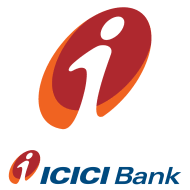



4. Retail sector companies such as Reliance Retail, Future Retail (Big Bazar and other stores), D’Mart, Aditya Birla Retail (Pantaloons), V Mart, Shoppers Stop, etc.



SPECIALISATION TRACKS IN THIS CAREER
Sales Executive
Sales Executives promote and sell a company’s products or services to customers, either directly or indirectly. They also provide customer services in certain cases, such as in case of sales to distribution channels. Direct sales involve selling to the end consumer while indirect sales involve selling to the distribution channel or to retailers.
Logistics and Supply Chain Executive
Logistics and Supply Chain Executives manage an organisation’s inward and outbound logistics and supply chain functions. Inward supply chain and logistics involve sourcing, buying, transportation, and storing of the goods that an organisation buys to produce its finished products and services. For example, to produce a car, a company has to source a lot of parts and instruments. Once bought these goods need to be stored well and when the goods are used, these need to be re-ordered. Outbound logistics and supply chain operations involve the dispatch of the finished goods produced by a company to customers - either to the end consumer directly or to channels like distribution channels.
Financial Services Executive
Primarily, Financial Services Executives promote and sell various financial products and services to potential customers. They often provide customer services as well. Examples of financial services include bank accounts, bank deposits, credit cards, business loans, personal loans, consumer loans, home loans, insurance, mutual funds, equity (shares of companies) brokerage services, and various other such services.
Financial Analyst
Financial Analysts analyse financial data of various companies from the financial accounting data, financial statements and other sources. They analyse to find out various information and insights about a company to understand the company's true financial situations. They prepare various reports based upon their analysis. Their reports help financial managers and senior managers to take decisions and specially help investors to take decisions as to whether they should invest in a company's capital or not.
Business Analyst
Business Analysts analyse various data about a business enterprise, its markets, customers, industry and various other important aspects which are linked to the doing of business by an enterprise. Business Analysts use various statistical and business analytic software to carry on their work. They analyse to make conclusions or build insights or get critical information which are useful for the senior managers of the business enterprise. Business Analysts also help others to visualise data and various reports based upon the data analysis.
Digital Marketing Executive
Digital Marketing Executives use various digital media platforms such as internet and mobile phones to inform, promote and advertise about various products or services of their company or their clients to a group of people (potential customers and others) who use digital media. Examples of digital media are various mobile apps, Facebook, Instagram, YouTube, search engines like Google, WhatsApp, various web pages that you visit, etc. The advertisements you see on these media, the social media posts, pages, etc. are all are the handiwork of Digital Marketing Executives.
Financial Operations / Banking Operations Executive
Financial Operations Executives work in a bank or a financial services company. They manage all the customer facing operations as well as all back office operations. If they work in a bank, they may work to handle cash receipts and disbursement to customers, open bank accounts, process loans, process credit card applications, handle customer issues and complaints, and so on. In other Financial Services companies such as in insurance companies, they process and deliver insurance policies to customers, process claims etc.
Retail Executive
Retail Executives work with organised retail enterprises (such as Big Bazar, D’Mart, Reliance Fresh, Spencer, etc. and numerous other retail stores in clothing, mobile phones, computers, footwear, electronics, jewellery, etc.) in various roles such as – Floor Salesperson or Executive, Retail Operations Executives, Logistics and Supply Chain Executives, etc.
Human Resources Executive
Human Resources Executives manage all the people management functions in a company such as recruitment, induction, training and development, performance management (assessment of work performance), compensation management (giving out salaries and other benefits) and management of employee recreation and leisure activities.
Accounts Executive (Financial Accounting)
Accounts Executives keep track of all the financial transactions and management functions in an organisation which include cash and bank transactions, billing, receiving and disbursement of cash, preparation of ledger, preparation of various types of financial accounts, preparation of statements of accounts, preparation of financial reports, etc. Almost all of these works are done using accounting software these days.
CAREER GROWTH
Overall, for future growth, it could be a good idea to do either a full-time 2-year MBA or a 1-year Executive MBA program or an equivalent program from a good Business School after having 5-6 years of work experience. You may also do a blended program in General Management or in a field of your choices. In blended programs, you may have to attend online live classes over the weekend and attend the campus of a Business School for a couple of weeks in a year. There are many options to upgrade your skills after you have 5-6 years of experience or even after you have 10-12 years of experience.
1. It is a good idea to upgrade your knowledge and skills every 2 years or so. All these will help to grow into senior management positions.
2. In Sales, you may grow from being a Trainee to an Executive and then a Senior Executive position. Then depending upon the kind of sector you are working in and your role, you may expect to grow into of an Area Sales Manager and then a Regional Manager. If you do well, in 12-15 years’ time, you may become a national level manager. Some of you will grow into positions such as Vice President – Sales and Sales Director. You may get a movement into Marketing too if you acquire higher qualifications and depending upon your work experience you can move from being a Product Manager or Brand Manager – Business Head – Associate Vice President and Vice President.
3. In Financial services, you generally grow into an Assistant Manager’s position and then into Manager’s position. Then you move from a Senior Manager to a Regional Business Manager or Associate Vice President’s role. Then you move into a Vice President and finally into a Director’s role.
4. In Business Analytics, you may move from being a Trainee to an Analyst and then an Associate Analyst. You can then move to become a Lead Analyst and then an Associate VP. You may grow to become the Chief Analyst if you acquire higher qualifications.
5. In Digital Marketing roles, you can grow from a Trainee to an Executive’s role and then to a Senior Executive’s role. Thereafter you move as an Assistant Manager – Manager – Senior Manager – Associate VP – VP -Director.
6. In operations roles, you can grow from a Trainee to an Executive’s role and then to a Senior Executive’s role. Thereafter you move as an Assistant Manager – Manager – Senior Manager – Associate VP – VP -Director.
Salary Offered
Initially, for various roles as mentioned under the job opportunities above, you may get a starting salary of about Rs. 12,000 – 25,000 or even more per month. You salary will be on a higher side if you are able to get into a new age role such as Business Analyst/Financial Analyst, in which the demand is quite high. If you are from a premier college or university and you have the right skills, you might even get a job with a starting salary of Rs. 35,000-40,000 a month. But these kinds of salaries are rarely given. Besides salaries, in sales jobs or customer service jobs, there are commissions and / or incentives as well as performance linked bonus. If you are a top performer in sales, you will earn quite handsomely.
1. If you chose not to opt for a higher study, then after 4-6 years of experience, you may earn about Rs. 20,000 – 40,000 a month and after 8-12 years of experience, Rs. 25,000-1,00,000 or even more per month.
2. For breaking into senior management positions, you will need a higher professional qualification / post graduate degree. If you can get such qualifications or degree from a reputed Business School, you may look forward to a great jump in your earning. For example, if you are acquiring such qualifications after 5/6 years of work experience, you can start earning about Rs. 2, 00,000 – 3, 50,000 a month or even more if you get the required qualifications from a reputed Business School. Otherwise too, if you get a higher qualification, you may expect to get 20-30% more in salaries.
3. In senior management positions, provided you have acquired a higher qualification from a reputed Business School then you can expect to earn about Rs. 6, 00,000 – 15,00,000 or even more per month. Otherwise, you may get stuck at the mid-level managerial positions and earn about Rs. 50,000 – 1, 50,000 a month.
Monthly Earnings In Indian Rupees
1. Entry level: 0 - 2 years of work experience
2. Junior Level: From 1 to 12 years of work experience
3. Mid-Level: From 5 to 20+ years of work experience
4. Senior Level: From 10 to 25+ years of work experience (there could be exceptions in some high-end technical, financial, engineering, creative, management, sports, and other careers; also in the near future, people will reach these levels much faster in many careers and in some careers, these levels will have no meaning as those careers will be completely tech skill driven such as even now, there is almost no level in a Cyber Security Expert’s job)
Work Activities
Addressing grievances and resolving conflicts: Handling complaints and grievance to resolve; resolving conflicts among co-workers or others at workplace or outside in relation to your work.
Analysing and interpreting data and information: Analysis of data and information to find facts, trends, reasons behind situations, etc.; interpretation of data to aid in decision making.
Communicating with co-workers and others: Communicating with people in writing, verbally or otherwise inside your workplace and various other people who have professional relationships with your place of work including vendors, government officials, etc. or with people at large.
Communicating with customers: Communicating with potential and existing customers of your organisation in writing, verbally or otherwise.
Creative thinking: Developing new ideas, concepts, innovative solutions to problems, newer ways of getting things done, designing products and services, creating work of art and craft, etc.
Decision making and problem solving: Analysis of data and information; evaluation of alternative decisions and results of decisions; taking the right decisions and solving problems.
Developing and maintaining inter-personal relationships: Developing professional relationships with co-workers and others outside organisations and maintaining good relationships.
Estimating quantity, cost, time and resources: Estimating sizes, volumes, distance, and quantity; estimating and determining time, costs, and resources; estimating materials required to perform a task.
Getting Information and learning: Observing, hearing, reading, using computers, or otherwise obtaining information and learning from it.
Handling administrative activities: Handling various administrative tasks and managing day-to-day operations.
Inspecting situations, events, and people: Inspecting situations, events and people to understand the reasons and causes for the situation or events to happen; inspecting people to understand reasons behind their behaviour and actions.
Negotiating: Negotiating terms, conditions, costs, prices and about other issues.
Organising, planning and prioritising tasks: Planning and organising tasks in order to achieve work goals; prioritising tasks to achieve goals and making the best use of the time available.
Providing advices and consultation to others: Giving advices or consultation to others about various issues, conceptual matters, know-hows, scientific matters, products or services.
Recruiting, enlisting and placing people resources: Sourcing, recruiting, selecting, enlisting and placing people in different positions and tasks in an organisation or for getting work done.
Scheduling tasks: Scheduling project timelines, tasks and activities.
Selling: Communicating about products and services with potential customers; influencing customers' decisions to buy products and services; helping people to buy products and services.
Strategic planning: Developing visions and goals, developing strategies and action plans for achieving visions and goals.
Updating and using relevant knowledge: Keeping updated with the latest knowledge relevant to your fields of work and use of the relevant knowledge in getting things done.
Using computers for work: Using computers for day-to-day office work; using computer software for various applications in day-to-day professional work; entering data and process information; for writing.
Working in a team: Working in a team of people; developing team; maintaining professional relationships among team members.
Future Prospects
As there are different roles that you can get into, future prospects will certainly vary. Overall, although there is a reducing demand for MBAs globally, many companies nowadays are recruiting graduates in a larger number. Specially, if you have an industry specific or function specific skill such as Financial Analysis, Business Analysis, Retail Management, Financial Services, etc.
In reference to the many industries in which you can get a job, financial services industry has been growing fast and is projected to grow rapidly over the next few years. The banking sector is also expanding.
Another growth industry is retail which is growing at an average annual rate of 30-35%. The future growth prospects are enormous. Online retail is also growing at 30% plus rate year on year. Growth in retail industry, especially online retail is also fuelling the demand for supply and logistics professionals.
The Business Analytics market is growing at about 7% CAGR (compounded annual growth rate) globally. This market is estimated to grow at a faster rate as companies are depending data analysis for decision making more and more. Big Data Analytics market will grow tremendously though, at a CAGR of 30%.
So, if you can choose your area of study well and get into a good college for your undergraduate degree in Business Administration or Management, you can look forward to developing a rewarding career.
Future Prospects At A Glance

